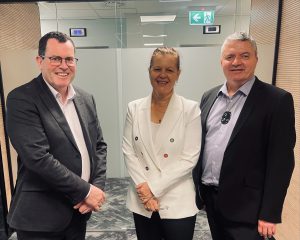
Scroll down to see all the articles
Changes to overseas pharmacists’ registration requirements
Council recently approved changes to policies for overseas pharmacists applying for registration in New Zealand, specifically overseas
registered pharmacists who qualified in countries other than Australia, Canada, Ireland, United Kingdom, and USA. This is the Non-Recognised Equivalent Qualifications Route (Non-REQR).
The key changes relating to registration via the non-REQR route include:
- Removing the criteria specifying post registration practice experience, that is, a minimum of one year practice in a clinical setting, within the last five years. Instead, applicants will complete a self-assessment of their qualification and practice experience against key components of the New Zealand B.Pharm curricula.
- The Knowledge Assessment of Pharmaceutical Sciences (KAPS) no longer needs to be completed before New Zealand Pharmacy Legislation Course.
- Changing the IELTS (International English Language Testing System) English Language Academic criteria, removing the requirement for an overall band score of 7.5, but requiring a minimum of 7.0 in each of the four bands (that is listening, reading, writing, and speaking).
We remain confident that without compromising public safety, the changes will make it easier and allow more applicants to enter this pathway for registration.
Prescribing Principles for Quality and Safe Prescribing Practice
On 29 June 2023 Council along with the six other Responsible Authorities (RA) regulating health practitioners who can prescribe therapeutic products in Aotearoa, invited the professions to provide feedback on a proposed set of Prescribing Principles for quality and safe prescribing practice. The principles have been agreed for consultation by Council and endorsed by the Council’s Te Tiriti Advisory Group. The consultation closed on Thursday, 31 August 2023.
We have joined collaboratively with:
- Dental Council of New Zealand | Te Kaunihera Tiaki Niho o Aotearoa
- Dietitians Board of New Zealand | Te Poari Tiaki Waewae o Aotearoa
- Medical Council of New Zealand | Te Kaunihera Rata o Aotearoa
- Midwifery Council | Te Tatau o te Whare Kahu
- Nursing Council of New Zealand | Te Kaunihera Tapuhi o Aotearoa
- Optometrists and Dispensing Opticians Board of New Zealand | Te Poari o ngā Kaimātai Whatu me ngā Kaiwahakarato Mōhiti),
and created the proposed set of Prescribing Principles, and we are now working together to consider feedback and make changes.
We received 172 responses to the consultation. Once the consultation and feedback received are collectively reviewed, a summary and outcome of the consultation will be published on Council’s website and shared in our Newsletter.
The Prescribing Principles aim to improve the quality of prescribing and support consistent regulation for health practitioners who prescribe. For pharmacists, the principles should be read along with the Competence Standards and viewed as complementary to them.
While the statement has been developed collaboratively by the RAs and will be adopted jointly, each RA may contextualise and operationalise the document with specific reference to its own work programme and profession.
MyRecert Review
This month we have been reviewing a sample of randomly chosen MyRecert portfolios (completed last recertification year, that is 1 April 2022 to 31 March 2023). The review is not an assessment per se and will not result in any compliance action this year.

We are still processing the review and will share the official summary on Council’s website shortly and in our next newsletter.
Council remains confident that most pharmacists are maintaining a high degree of professional development to maintain their fitness and competence and doing the right thing by recording against the recertification requirements as applicable.
Health and Disability Commissioner (HDC) decision
Importance of undertaking adequate checks when dispensing medication
A recently published HDC decision highlighted the need for robust checking Standard Operating Procedures (SOPs) and the importance of timely communication with patients and their whānau when an incident occurs.
The report concerns a pharmacist’s failure to check a medication adequately before it was given to a consumer. The incorrect medication (cyclosporin 50mg instead of mycophenolate (CellCept) 500mg) had been selected and prepared by an intern before it was provided to the pharmacist for checking.
The HDC found the pharmacist did not identify the medication error or follow the dispensing SOP or the Competence Standards for dispensing and following relevant policies, procedures and documentation. Further, the pharmacist failed both to record the error on the patient’s file adequately and provide a written apology to the patient upon becoming aware of the error, contrary to the Managing Dispensing Errors SOP.
The patient took the incorrect medication for 17 days and was hospitalised; the error was detected in hospital and the pharmacy notified. A staff meeting was held to discuss the error and included a collaborative Root Cause Analysis. However, this was not documented in a formal Root Cause Analysis form but rather meeting minutes. The pharmacy identified that the busy-ness of the pharmacy and the packaging of the medication (contained in large foil packaging) may have contributed to the error. The patient sadly passed away. HDC noted there was no mention of what support has been provided to staff members, or how pressure, workflow and distractions can be better managed when it is busy. The expert advisor to the HDC, Catherine Keenan, advised that “While I understand these discussions can be difficult and time intensive, it does go towards providing a safe and more enjoyable workplace culture if staff feel supported and encouraged to speak up”.
Continuous Professional Development (CPD) e-learning opportunity
Code of Health and Disability Consumers’ Rights (the Code)
In December, the HDC launched an e-learning module for health care providers to fully understand the Code so they can incorporate it into their everyday practice. These modules will improve your knowledge and understanding of the Code and your legal obligations for managing complaints, and the factors that encourage early resolution. These modules can be used towards your CPD requirements.
Summaries of the recent HPDT findings
The Tribunal has released a decision in relation to pharmacist John Collett. The Tribunal found that Mr Collett’s conviction for stealing a controlled drug (methadone) from his employer reflected adversely on his fitness to practice.
Further, his dilution, storage and dispensing of methadone, entering the pharmacy outside his usual working hours and disabling security cameras and a further theft of methadone was a significant departure from accepted standards of conduct; that brings discredit to the profession and amounted to negligence and/or malpractice.
Mr Collett’s registration was cancelled, he was censured, and ordered to pay costs.
Read the recent HPDT decisions resulting in laying charges against pharmacists.
OUR ENGAGEMENT JOURNEY
Council/Professional Associations Quarterly e-Hui

September’s e-hui with Professional Associations’ representatives
We continue to regularly meet with the Associations’ representatives. You have already read about Council / Professional Associations Quarterly hui, where we provide an update on current Council’s key activities. The most recent one took place on 4 September, and we were joined by:
- Pharmaceutical Society – Helen Morgan-Banda
- Pharmacy Guild – Andrew Gaudin
- Māori Pharmacist Association – Mariana Hudson
- Hospital Pharmacist Association – Sian Dawson Clinical Advisory
- Pharmacist Association – Penny Clarke
- Independent Pharmacists’ Association – Jie Ning Choong
- Pharmacy Defense Association – Kurt Docherty
The agenda included: MyRecert Review, Consultation on Prescribing Principles Statement, REQR and non-REQR processes, and workforce shortages/professional wellbeing.
Interview with Robert Haua, Māori PhD Pharmacist

Dr Robert Haua
Pharmacy Council: Kia ora Robert. A big congratulations are in order! Ko wai koe? Can you tell us who are you? What is your whakapapa?
Robert: He uri ahau nō Ngāi Te Rangi. Ko Mauao tōku maunga. Ko Tauranga tōku moana. Ko Mātaatua tōku waka. Ko Ngāti He tōku hapū. Ko Opopoti tōku marae. Nō Tauranga ahau, engari i tipu ake ahau ki Rotorua. Kei Tāmaki Makaurau taku kāinga ināianei.
I am from Tauranga originally, but moved to Rotorua when I was five years old and completed all of my schooling there. I moved to Auckland in 2012 to study pharmacy and have stayed there ever since!
Pharmacy Council: Where did you find support that helped you to be where you are today? Whanau? Iwi? Mentors?
Robert: I’ve been so grateful to have had the support of so many people right throughout my life. Of course, my family are there for me unconditionally and I have an amazing friend group who were always there when I needed a distraction from my research! I’m especially grateful to Ngā Kaitiaki o Te Puna Rongoā – The Māori Pharmacists’ Association, who have supported my journey throughout university and in my professional career. A big shout out in particular to Jo Hikaka who was doing her PhD at the same time as me and was able to listen and empathise with me about everything that was going on!
And last but not least, my supervisors, Dr Trudi Aspden and Dr Jeff Harrison from the University of Auckland. They never gave up on me and kept me motivated throughout the whole process. I’m so lucky to have been able to have drawn upon their collective wisdom.
Pharmacy Council: Were there any challenges? How did you overcome them?
Robert: Completing a PhD was one of the hardest things I’ve had to do and there were plenty of challenges along the way. The two biggest ones for me were the COVID-19 pandemic which considerably delayed my data collection, and also we had a major health reform right in the middle of my PhD which significantly changed the context in which my research was conducted.
There wasn’t much I could do about either of these things, but it did mean I had to do a reorientation part way through to ensure that I was still able to collect the data I needed to in an appropriate timeframe, and make sure the findings and recommendations would still be relevant in the new system. There are lots of things I would have done differently looking back, but that’s the beauty of hindsight!
Pharmacy Council: How have you and your whanau celebrated your achievement? They must be so proud.
Robert: There has certainly been lots of celebrations with friends and whānau! There’s been lots of food and champagne, and I was finally able to actually take some time off for a holiday which was nice.
Pharmacy Council: Your work focuses on pharmacist integration into general practice in Aotearoa New Zealand. Is this the future for the pharmacy profession?
Robert: I think integrating pharmacists in general practice has the potential to make a huge difference for patients, the health system and our profession. I heard a lot about the value the role has for patients who have increased medicines adherence and improved health outcomes, for GPs who have their time freed up and benefit from ready access to expert knowledge about medicines, for the wider system in terms of the potential to reduce hospital readmissions and rationalise medicines use, and for pharmacists who experience immense job satisfaction from working in these roles.
I’m excited that Te Whatu Ora is progressing the development of comprehensive primary care teams within localities, which will include pharmacists in general practice. That being said, I think it’s important that this is done properly, with considered planning and enough resource for effective implementation. Hopefully, the findings of my research can help this process.
Pharmacy Council: The Minister of Health released the number of professionals required to boost the healthcare workforce. How would you encourage more Māori into pharmacy?
Robert: I think a key problem that continues to act as a barrier to recruiting more Māori into pharmacy is that people just don’t know what pharmacy is and what pharmacists do. This came up a lot in my research and so if health professionals don’t know the skills and capabilities of pharmacists then how can we expect the general public, iwi, and future generations to know? So, I think we need to do a better job at showcasing our abilities. I know PSNZ and others have led campaigns in this space, but there is more to do. I think the best thing we can do is present a united vision of the profession, and then advocate for, and implement, new and innovative roles for pharmacists that showcase our offering – including pharmacists in general practice. If people see first-hand the impact we can have on their health and wellbeing, then I think the rest will follow in due course.
We also need to do a better job of partnering with iwi and hapori Māori and actually work alongside them to promote pharmacy. I think messaging is more powerful when it comes from Māori and those that they are familiar with, and through engagement with marae, information about pharmacy as a career choice will filter through whānau to future tauira.
Let’s also advocate for, and support the development of, more Māori pharmacists in leadership positions within pharmacy and wider health system!
Pharmacy Council: Thank you, Robert! Congratulations again and all the best for a successful professional career!
Mihi whakatau for the new Chief Executive of Pharmaceutical Society

From left: Michael Pead, Helen Morgan-Banda, and Arthur Bauld
In August we conducted a mihi whakatau for Helen Morgan-Banda, new Chief Executive of Pharmaceutical Society who was accompanied by Rhiannon Braund, the President of the Society.
The meeting was a great opportunity to discuss Council’s role and introduce the Pharmacy Council operational team members as well as their main responsibilities. Helen was also a special guest during recent Pharmacy Council members meeting.
All the best in your new role, Helen!
KEEPING YOU UP TO DATE
Communication survey summary
Focus on improving our communication with you has been part of our key strategy since 2020. We continue to challenge ourselves and keep asking how we can meet your preferences and expectations in the communication area.
The main purpose of the communication survey was to gather feedback from as many of you as possible to see what your preferences and expectations are.
Unfortunately, we only received 204 responses. Though this number doesn’t represent the profession voice, we want to thank those who made time to talk to us on the phone and/or respond to the online survey.
We will continue to:
- build on clear and transparent messages throughout all the communication channels,
- create the content that is valuable for you, including: MyRecert, APC, what Council is up to, practice standards, code of ethics, the Register and positional statements, and
- improve our Newsletter, emails and Council’s website accordingly.
We hope you already see the changes in the communication area happening.
Governance Charter of Te Pou Whakamana Kaimatū o Aotearoa
We have been on a journey, and we aren’t there yet, but we have set forth. The development of this governance charter strengthens our intent and outlines the behaviours expected of ourselves and enables all to hold us to account.
We wish to pay our respects to those without whom, this project would not have made it to the start line and there would be no waka and no haerenga, no kōkirihia, no setting forth.
Our thanks go to so many for so much and in so many different ways;
- Matua Hiwinui Heke gifted Council with our name – Te Pou Whakamana Kaimatū o Aotearoa,
- Tā John Clarke guided our team in the spirit of a consummate Kaumātua,
- Ripeka Evans and Mahanga Maru who helped shape our thinking and our teams,
- Dee Isaacs and Graeme Nahkies who provided our narratives interwoven with governance,
- Jerome Ng and Hana Meinders-Sykes for erudite policy guidance,
- Bronwyn Clark as the first CE for Council established the relationships that bore these fruits,
- Eleanor Hawthorn as the first Māori Chair of Council who led by showing what was possible,
- Leanne Te Karu, Darryn Russell, Te Kani Kingi who inspired, debated, promoted their fellow board members into understanding a Te Ao Māori world view – and a continuous slew of Pharmacy Council members and Operational Team members, past and present, who repeatedly stood up for a different way forward that honours both Māori and Pākehā without diminishing the other.

The design was thoughtfully created in collaboration with Tukara Matthews, nō Tauranga moana ia, a graphic designer who helped to visualise the meaning behind the Charter words.
To everyone concerned, you may have been a source of inspiration, a moral compass, a sounding board, a major contributor or a hope for the future and most likely a combination of all of the above, and we are endlessly grateful.
We appreciate your support on our cultural journey as an organisation and also in directing Council’s way of thinking to help us reach this point along the way. We extend our gratitude to everyone who shared with us their extensive knowledge, values, and thoughts in our cultural development, as manifested within the Charter.
We are pleased to present to both the public and the profession with the Te Pou Whakamana Kaimatū o Aotearoa Governance Charter.
The Charter now forms the basis for how we behave in all matters facing our organisation. It strengthens our mission, our vision, our values and ultimately the way we do “business”.
Read the Governance Charter of Te Pou Whakamana Kaimatū o Aotearoa.

